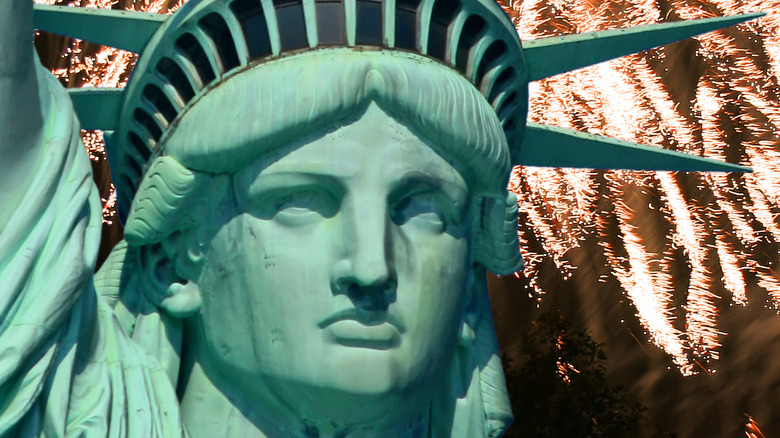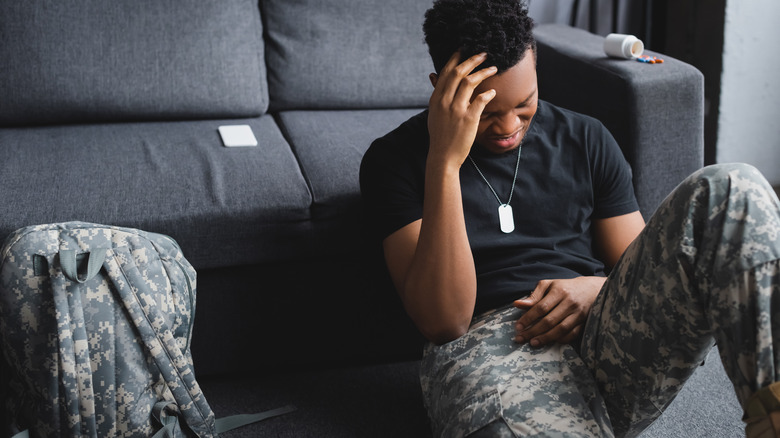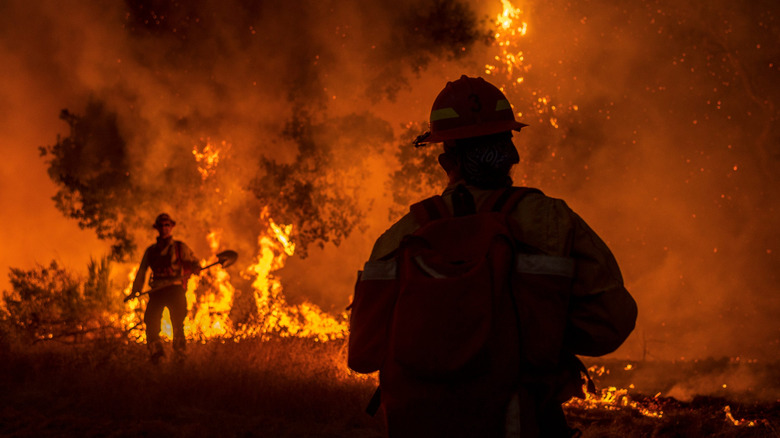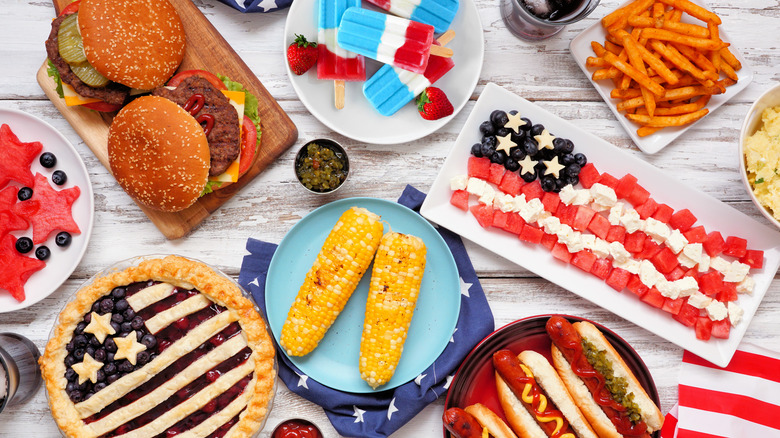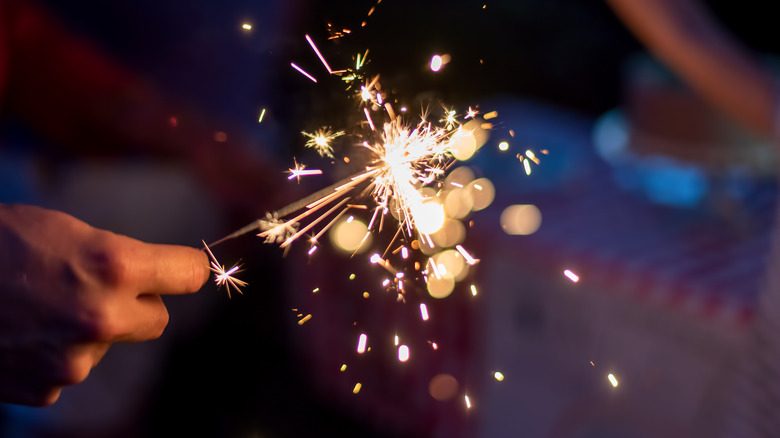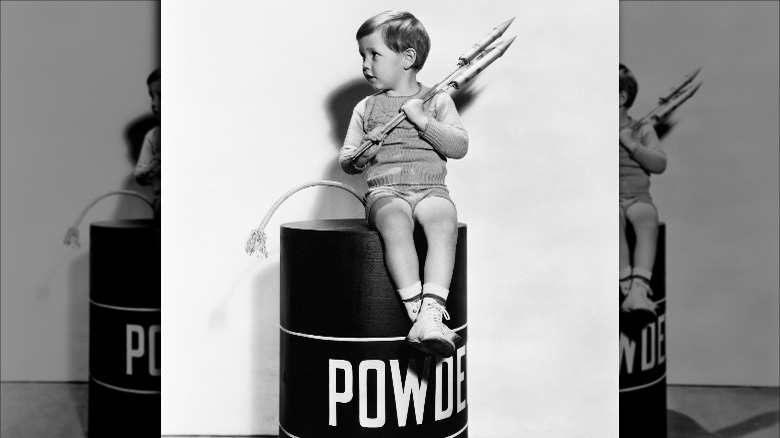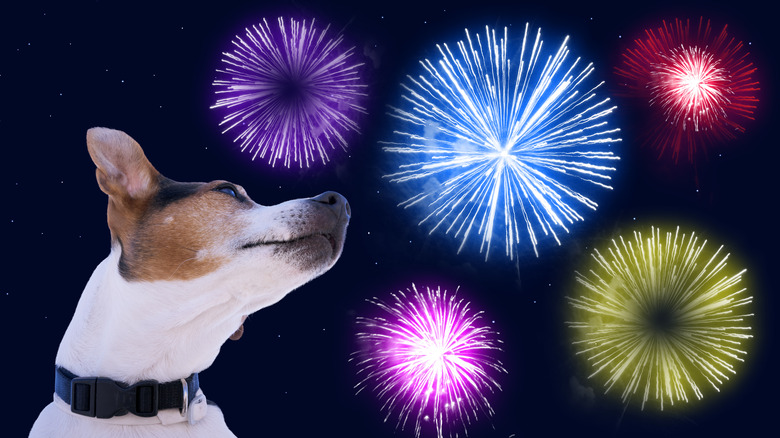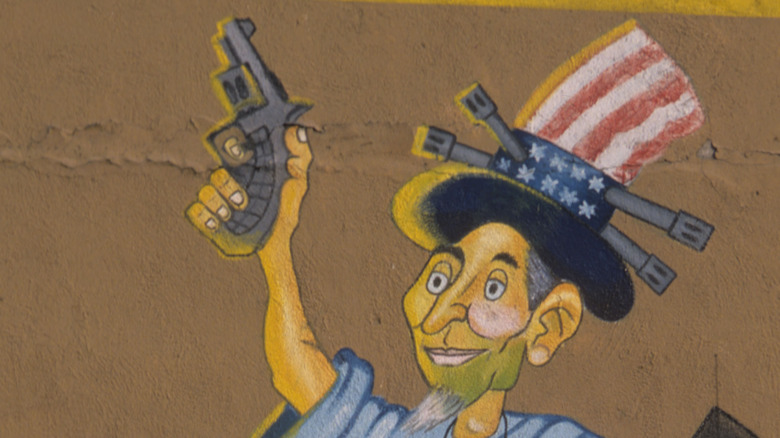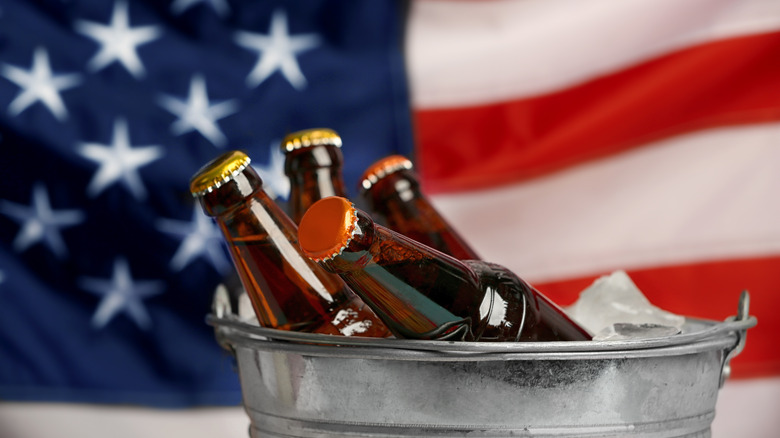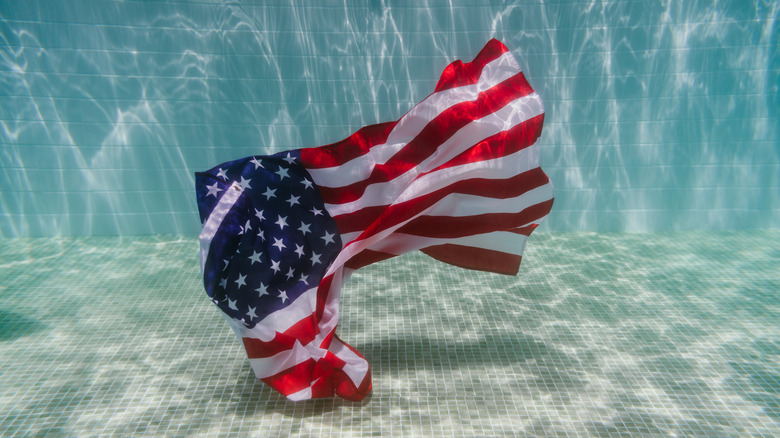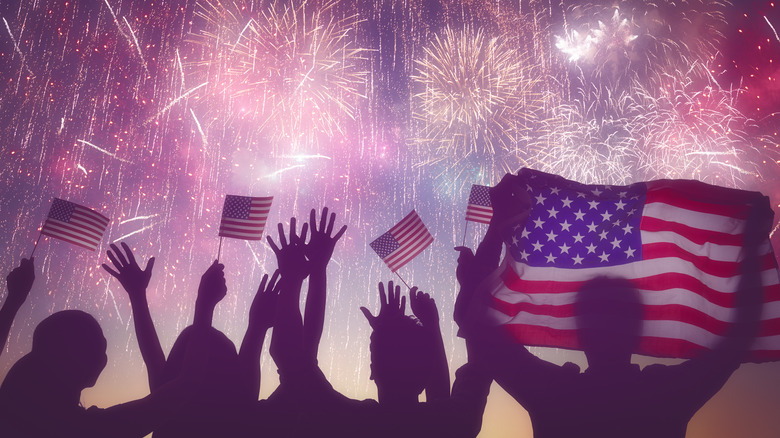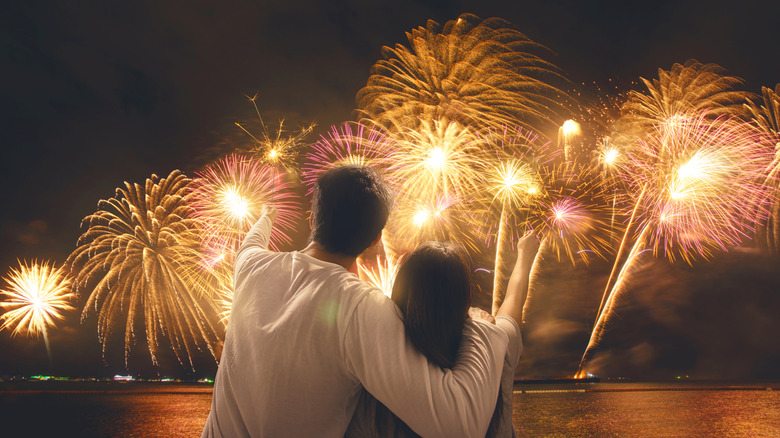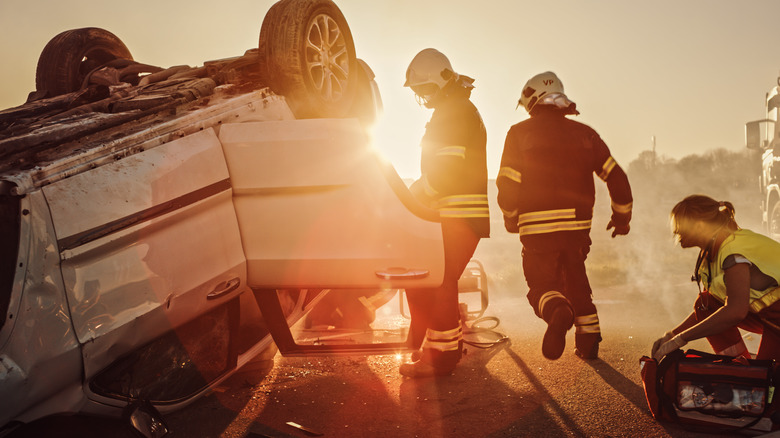The Messed Up Truth About The 4th Of July
The 4th of July is a bit of a strange holiday, starting with the fact that it's not technically America's Independence Day. As the National Constitution Center says, the actual day that the Continental Congress gave Britain the big ol' middle finger was July 2, 1776: That's when they officially dissolved the relationship between the two countries. Even John Adams wrote that from that year forward, July 2 would be a time for celebration. So, what gives?
Essentially, they needed time to explain to everyone what they'd done, so it wasn't until the 4th that the Declaration of Independence was approved and printed. To make things even more confusing, most people didn't even sign it until August 2, so as far as the 4th of July being America's Independence Day, it's more of a "close enough" sort of situation.
So now, every year, people get together, enjoy a long weekend, and get really, really drunk to celebrate American independence. But here's the thing: When it comes to national holidays, the truth of the 4th of July is actually pretty messed up.
Fireworks traumatize a huge percentage of the population
Fireworks have been a part of 4th of July celebrations since the very beginning, says PBS, and while that means people have been oohing and aahing over them for centuries, it also means they've tormented generations of Americans.
Arash Javanbakht is an associate professor of psychiatry at Wayne State University, and says (via The Conversation) that for those suffering from PTSD — particularly combat veterans — the fireworks that go off on and around the holiday can be downright traumatizing. Javanbakht explains: "The holiday is a terrifying ordeal. That's because the noise of fireworks — loud, sudden, and reminiscent of war — rocks their nervous system."
Penn Medicine News also says that fireworks are definitely a major trigger for combat veterans, and it's important to note that they're not the only ones who suffer through 4th of July fireworks. Javanbakht says that the sounds of fireworks can also be traumatic for survivors of gun violence, natural disasters, accidents, people with developmental disabilities or autism, and victims of physical or sexual assaults. Fireworks occurring around but not on the 4th can be even more damaging, as they're even more sudden, unexpected, and terrifying. Flashbacks from fireworks can be so real "it seem[s] as if the old trauma is happening here and now," and someone suffering from PTSD can see their symptoms worsen long after the 4th is over.
The nation faces unnecessary fires and destruction around the 4th of July
In 2020, the San Francisco Chronicle reported that fire departments in the Bay Area had responded to hundreds of calls during the 4th of July weekend, and there were so many they couldn't keep up. Fires — most of which were started by fireworks — were popping up across the area, and they weren't talking about tiny little flare-ups. One vegetation fire in Santa Clara County spread over around 100 acres, while others burned their way toward homes and communities. Days later, the National Weather Service was reporting the air was still full of smoke from all the fires, which had just kept coming in spite of a plea from fire department Lieutenant Jonathan Baxter. He had posted a video showing some of the fires to social media, saying, "If you will, please consider not using fireworks. It's burning down the city, it's not nice. ... Let's stop this."
And that's just in the San Francisco area. The Los Angeles Times reported that in 2020, the Los Angeles Fire Department responded to around 3,000 calls on the 4th of July weekend, and again, blazes were serious — especially the one that destroyed a Northridge apartment building.
The National Fire Protection Association issued a report in 2020, and it's eye-opening stuff. Emergency crews responded to 19,500 fireworks-related fires in 2018, which resulted in five deaths and around $105 million in damages.
There's an extra high possibility of getting food poisoning on the 4th of July
One of the best parts of a 4th of July weekend is the inevitable cookouts. There's nothing quite like breaking out the grill and cooking outside — probably while sipping a few frosty cold beers in the afternoon sun — and let's face it, that's what life is about, right?
It turns out that there's a dark side to these outdoor get-togethers, and it could ruin your week. EHSToday says that food poisoning cases rise as the weather gets warmer, and hot July afternoons coupled with outdoor eating is a recipe for disaster. The Injury Law Firm of South Florida calls food poisoning "a bigger 4th of July danger than Floridians realize," and it turns out there's a lot of nastiness — in the form of things like Salmonella and E. coli — lurking on that picnic table.
Food Safety News and the USDA issue regular warnings about 4th of July dangers, and they say some of the biggest mistakes are leaving food outside, not keeping it hot enough or cold enough, and not cooking meat all the way through. They estimated that only about 23 percent of people use a thermometer when grilling burgers, and given that research has found one in four burgers looks done before it's actually been brought up to a safe temperature, well, that means you're playing Russian roulette with potentially deadly food poisoning.
Fireworks injuries are gruesome
The US Consumer Product Safety Commission says (via LiveScience) that in 2018, there were 9,100 incidents where fireworks sent people to the emergency room — and 5,600 happened in the weeks around the 4th of July. As if that's not bad enough, they also say that the age group with the highest injury rate are those between 10 and 14. Why? SelectHealth says that some of the least dangerous-looking fireworks — sparklers and firecrackers — are each responsible for about 20% of all injuries.
What about the other 60%? USCNews says that hand and finger amputations, ruptured eardrums, and eye injuries were the most common, and as bad as that is, they're not even the worst.
In 2011, a 41-year-old man walked out to the middle of a Fargo, North Dakota street, and lit a firework. A neighbor saw what happened next (via NBC News): "Within 10 seconds of talking to him, he lit it and all we saw was a cloud of smoke, and a bang. When I walked up to his body, it was nothing but his shoulders down." A 25-year-old man was killed in Kentucky in 2017, when a completely legal-to-use firework hit him in the chest and stopped his heart, says LiveScience. The same year, a San Antonio man lit a firecracker that went off and lodged in his leg, resulting in not only a trip to the hospital, but a call to Explosive Ordnance Disposal as well. Bottom line? Don't be a statistic.
The 4th of July was associated with a deadly disease for a long time
Just because we can do something, that doesn't necessarily mean that we should. Can we give children their own miniature fireworks, with a canon to shoot them with? Sure! Should we? Maybe not. This poor life choice waiting to happen is exactly what did happen in the late 19th century. According to the Smithsonian, toymakers wanted kids to get in on the whole patriotic action, and started making "only safe and sane" fireworks that were just the right size for little hands... but this isn't going where it seems to be going.
It turns out that when turn-of-the-century revelers set off fireworks on the ground, they kicked up a ton of dirt. And it wasn't just dirt — it often contained the spores that cause tetanus, a bacterial disease that kills around 90% of those infected, and in a terrible way: Muscle spasms can get so bad, they'll snap bones.
Tetanus cases rose so much around the 4th of July that it became known as "patriotic tetanus," or "patriotic lockjaw." It was a huge problem: In 1903 alone, 406 people died of it. The American Medical Association started keeping track of the number of cases of patriotic tetanus, and by the time tetanus vaccines were widely available, it was accounting for as much as 66% of 4th of July injuries.
Runaway pet statistics are heartbreaking
Pet Amber Alert is a national missing pet database, and they've shared some heartbreaking statistics (via PR Newswire). They say that animal shelters across the country see a massive spike in intakes on July 5, and there's some pretty heartbreaking numbers that go along with that. "Sadly, only 14% of lost pets are returned to their owners," says Pet Amber Alert founder Mark Jakubczak. "And worse, 30-60% of lost pets are euthanized because they cannot be properly identified to their owners."
The ASPCA says that an average of one in five lost pets run because of sudden loud noises, like fireworks, but The American Kennel Club says there's even more to it than just the scary sounds of fireworks. Those backyard BBQs that are so much fun for people can be overwhelming for pets who are used to a quiet daily routine, and between strange people coming and going, loud noises, unfamiliar disruptions in routine, it all leads to a weekend where more pets go missing than any other time of the year. Many will never see their families again, and there's a good chance it'll mean the end of their lives.
For those who don't flee, it's just as traumatic. The RSPCA estimates around 62% of dogs will show severe fear and psychological distress during fireworks displays, along with 54% of cats and 55% of horses. Deaths of farm animals, birds, and other wildlife happen all the time, and that's just awful.
There's a rise in gun violence
On July 3, 1776, John Adams wrote a letter to his wife, in which he detailed exactly how he hoped future generations would celebrate the (next) day, and it was with "Pomp and Parade, with Shews, Games, Sports, Guns, Bells, Bonfires, and Illuminations" (via Boston). Guns? It turns out that Americans do, indeed, tend to involve guns on the 4th of July, but it might not be exactly what Adams had intended.
On the website of the Los Angeles Police Department, there's a page dedicated to their "4th of July Gunfire Reduction Program." On it, they say they're going to be cracking down on people who think firing their guns into the air is a great way to celebrate freedom, because of incidents like the 1999 death of 9-year-old Brian Perez. What goes up, must come down, and he was hit and killed by a bullet someone had fired into the air.
In more recent years, there's even been a spike in gun violence. Independence Day weekend in 2020 saw — for example — 44 shootings, 63 victims, and at least nine deaths in New York City (via NBC), and in Chicago, 79 people were shot and 15 killed over the same weekend (via the Chicago Sun-Times). The AP says instances of gun violence broke out across the country, and among the dead were Charmaine Turner's 8-year-old daughter Secoriea, 7-year-old Natalia Wallace, 8-year-old Royta Giles Jr., 6-year-old Jace Young, and 11-year-old Davon McNeal.
Binge drinking is a serious problem
Part of the fun of the 4th of July is having really cold drinks on a really hot afternoon, evening, and night, surrounded by friends and family that you might not get the chance to see that often — and there's nothing wrong with that at all.
But according to the American Addiction Centers, that's the same thing that makes the 4th of July one of the most dangerous days of the year when it comes to drinking, driving, and fatal car accidents. They say that there's an average of 34.4 million people that hit the road on the 4th of July week and weekend, and 68 million cases of beer get consumed alongside that. The result is oftentimes deadly, and that's not even the only problem here.
The National Institute on Drug Abuse says that around the 4th, alcohol brings an average of 942 visits to the emergency room on each day of that long weekend — and that's just taking into account people who are under the age of 21. One of the reasons, they say, is that teens who are attending parties like 4th of July celebrations are more likely to partake — and go overboard — because it's a special occasion.
There's a spike in drownings
It turns out that there's no shortage of ways to die during the 4th of July holiday, and sadly, it's children who are all too often the victims of parties and parents not paying attention.
Estimates vary, but either way, they're not good. The USA Swimming Foundation says (via News Channel 20) that an average of 17 to 19 children die in drowning accidents on every 4th of July, and lifeguard and swim instructor Devon Boyle says that it happens so often in part because at a party, everyone assumes that because there's a ton of people hanging out at the pool, they're going to notice if someone's in trouble.
That's absolutely not the case, and he adds: "People think that when someone is drowning, it's the stereotypical arms in the air and screaming 'help!' But most of the time, by the time the child realizes they need help, they're already going under."
The 4th of July has been seen as being filled with hypocrisy
While the 4th of July seems like it might be a great time to come together as a nation and celebrate all being American, that's not the case at all — and the holiday has been called out for hypocrisy for a long time. On July 5, 1852, Frederick Douglass delivered a speech called "The Meaning of July Fourth for the Negro," and he asked (via Color Lines): "What, to the American slave, is your Fourth of July? I answer: a day that reveals to him, more than all the other days in the year, the gross injustice and cruelty to which he is the constant victim. To him, your celebration is a sham."
Fast forward to the 21st century and a country torn by protests and a deep racial divide, and PBS argues that the 4th of July remains a holiday that's more alienating than inclusive. The Declaration of Independence, after all, also condemns Britain for "excit[ing] domestic insurrections amongst us," and stirring conflict between those the signers represented and "the merciless Indian Savages."
It's a sentiment that hasn't really aged well, and according to those PBS interviewed, the 4th brings up nothing but feelings of being on the outside. Donna K. Cobb explained, "My family are Mvskoke Creek tribal members, and having our ancestral lands stolen, millions killed, tortured, and raped... doesn't give Indian folk much to celebrate."
The 4th of July is associated with permanent hearing loss
While many people might think that the louder fireworks are, the better they are, it turns out that's a dangerous attitude to have.
EHSToday says that a whopping 17 million Americans have something called sensorineural hearing loss. That's hearing loss that's entirely preventable, can be absolutely irreversible, and can happen with the loud bang of a single firecracker. Noise-induced hearing loss (NIHL) can manifest in a few different ways, from ringing to eardrum tears, and the louder the noises someone is exposed to, the worse — and more permanent — it can get.
So, what's that mean when it comes to the 4th of July? Fireworks are potentially deafening because of the chemical reaction that happens when they pop, and when they explode, they're not just pretty — Healthy Hearing says they're bringing sounds that are usually somewhere between 150 and 175 decibels. For a bit of a comparison, a live rock concert usually comes in at around 110 decibels, and a jet engine at takeoff is around 140. That all means that just one close encounter with a firework can lead to permanent hearing loss, and... is it really worth it?
The 4th of July is one of the deadliest holiday weekends to be on the road
The 4th of July weekend is a great time to plan a trip to see the friends you haven't caught up with in ages... or to plan a trip to have a convenient excuse to get out of that family gathering. There's a massive catch, though: Forbes says the 4th of July weekend is one of the deadliest on America's roads.
Every year, the National Safety Council estimates how many people will be injured or die in traffic accidents over the weekend of the 4th, and they're pretty dire predictions. The exact numbers vary, but they tend to hover in the area of between 400 and 600 fatalities, and that's not great no matter how you look at it. In 2019, they forecasted not just 600 deaths, but 64,500 serious injuries sustained by those fortunate enough to survive.
There are a few different things at work here, and while one of the factors is the sheer number of drivers on the road, the NSC also notes that the percentage of accidents that involve a drunk driver are higher on the 4th of July than on any other holiday. Paulson Coletti Trial Attorneys PC add that there's also an average of a 46% increase in the number of pedestrian fatalities during this same weekend, and here's something else to keep in mind: The most fatalities tend to occur between 9pm and midnight, while most accidents involving drunk drivers happen between 11pm and midnight. So... maybe stay home and stay safe?
